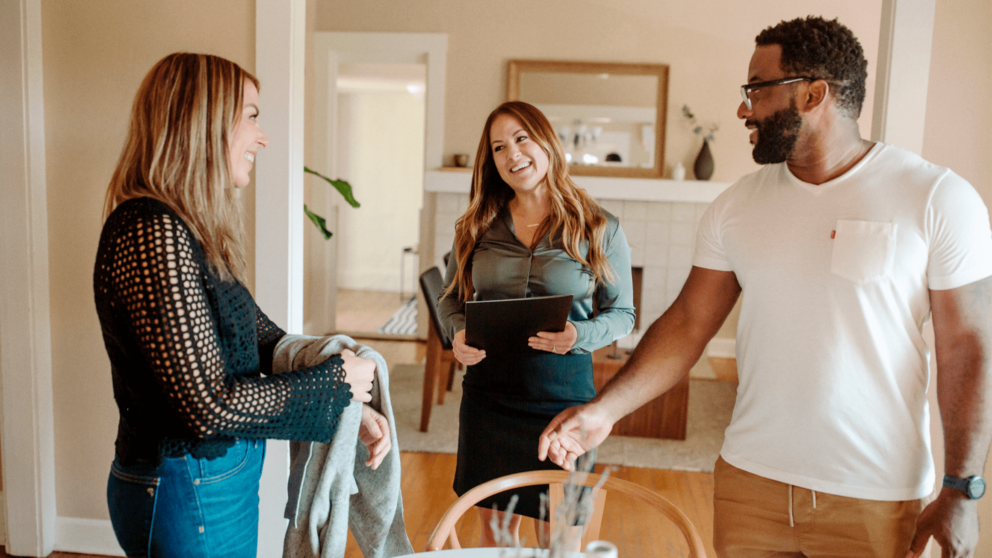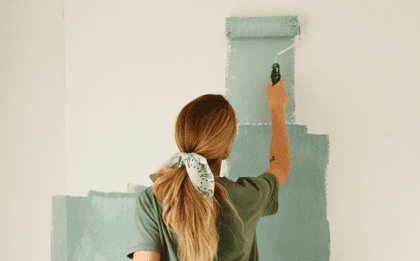First time home buyer guide
Being a first-time buyer is exciting and full of new experiences but can also be very daunting. Our easy guide gives you all the intel when it comes to buying a house for the first time – so that you’re ready to begin your own home moving journey.
In this guide
What is a first-time buyer?
How do first time buyer mortgages work?
What does loan to value mean?
Can first time buyers get a 95% mortgage?
Do first time buyers pay stamp duty?
Costs of buying a property
Finding your ideal home
House viewing tips
Making an offer
Once your offer is accepted
What is a first-time buyer?
While most will know that a first-time buyer is simply someone who has never previously owned a property of any sort, there are some circumstances in the property industry where this can become slightly more confusing. At times, there will be more specific requirements to qualify as a first-time buyer – for example: inheriting property, owning a property abroad or buying as a couple (both of you in this case must qualify as first time buyers) can all be factors that alter your status as a first-time buyer.
How do first time buyer mortgages work?
Put simply, a mortgage is a loan used to purchase or maintain a home, land, or other types of estate. Most run for 25 years but the term can be shorter or longer. The loan is ‘secured’ against the value of your home until it’s paid off. Usually, people would have their deposit for a house ready before approaching a mortgage advisor.
What does loan to value mean?
LTV means loan to value. This is the amount you want to borrow, as a percentage and in relation to the overall value of the property you’d like to buy. For example: if you have a deposit of £70,000 ready to put towards a house worth £350,000, your LTV would be 80%, as 20% would have been put forward by you.
The average salary in the UK is around £22,000, but the average house price is more than £270,000. Even with lots of saving, it would take a very long time to have enough money to buy a house outright. Therefore, for most of us, at least in the UK, in order to buy a property, some kind of loan or mortgage is necessary.
Can first time buyers get a 95% mortgage?
More recently, mortgage lenders will lend to any home buyer who may only have a 5% deposit. This is under the 95% mortgage scheme where the government has agreed to underwrite a part of the loan. This will help lots of people into home ownership, but there are eligibility criteria’s in place and while it is possible, it will mean that your monthly payments will be higher.
Do first time buyers pay stamp duty?
Stamp duty is the money paid to the government on any home or land bought in England and Northern Ireland. It is paid by the buyer and is worked out as a percentage of the cost of the property you are buying, depending on the price band it falls in.
As a first-time buyer, your circumstances change; ensuring you qualify. First time buyers may have to pay stamp duty but at a reduced cost. If you’re a first-time buyer purchasing a property under £300,000, you do not have to pay it at all. If your property is less than £500,000 you won’t pay stamp duty on the first £300,000 – just 5% on the difference between the £300,000 – £500,000.
However, if you’re a first-time buyer and are purchasing a home over £500,000, you’ll pay the normal rates.
Costs of buying a property
Along with your mortgage, there are a few extra fees you will have to pay before and after securing your new home. We have given you a breakdown of some additional charges.
Mortgage valuation fee
Lenders charge this to check how much the property you’re buying is worth. This is done for lenders security, and it’s recommended to save around £300 for it; although sometimes they can be more, or cost nothing, it’s worth preparing for.
Surveyor’s fees
This fee is optional, so you don’t necessarily have to worry about it, but it could benefit you. Surveys check the property you’re buying is in good condition and could potentially allow you to negotiate the price if anything is picked up.
Conveyancing fees
These are a group of costs that cover all the legal work associated with buying a home. For example: Land Registry fees, stamp duty fee, local searches, and ID checks. The fees you pay will differ depending on the situation, but conveyancer will confirm this. The process involves conveyancing, checking paperwork, and whether environmental factors, planning permission issues or other factors which could cause issues.
Stamp duty
As mentioned above, stamp duty is the fee paid to government for the ownership of any land or property. First time buyers pay a reduced rate as long as the property being purchased is less than £500,000.
Removal fees
These might not be necessary if you don’t have a lot of furniture, or if you have enough people to help you move it all, however it is something to consider when budgeting as the price can vary from several hundreds to a thousand.
Finding your ideal home
As a first-time buyer, finding your ideal home is exciting, but it can often be stressful too. When you have an idea of what you want in your head, it is important to weigh up the pros and cons, to ensure it works for you and your situation and this may change what you ultimately view as your ideal home.
One thing to consider when looking for your new home is your finances, especially if you are buying for the first time. Unless you are a cash buyer, you will most likely have to save for a deposit (usually 5% of the overall property cost). This could make you change or rethink your daily spending habits.
Similarly, if you are a first-time buyer, you will not have a property to sell, and therefore not have a rough guideline of how much to spend. It is always worth looking at similar properties on the market to your ideal home, so you can gauge how much you should be spending.
Another thing to consider when finding your ideal home is prioritising and making sacrifices. Sometimes it can be easy to get carried away when thinking about what features will make up your dream home. However, if you are restricted by a budget, it may be worth thinking about which of those features are priorities and which you could potentially go without. For example, you may not originally plan to live in a busy school road, but if you are out of the house during main school hours, it may not be as big of an issue. Similarly, considering things such as parking, garden size etc will all help you to narrow down to your ideal property.
Check out our blog on finding your ideal home and read our step by step guide for more information.
House viewing tips
As a first-time buyer, everything will be new to you, including viewing properties. We’ve got a few pieces of advice that should make your initial viewing stage that little bit easier.
Take your time
When viewing for the first time, it’s easy to feel under pressure by other viewers or even the owner. But it’s important to take your time, get a feel for the property and see if you can visualise living there. It’s also worth putting time aside to explore the area around it for a better idea of what living in the new home could be like. If you’re looking at moving out of your local area, have a look and see if there are supermarkets nearby, if it is easy to access public transport and so on.
Ask questions
Viewing your first home can be nerve wracking, but we recommend that you make the most of it and ask any questions you have, as it will be your best chance to find out more things about the property, for example, what are the neighbours like? How long has it been on the market? Also, by doing this you will seem like a much more friendly and interested buyer which will benefit you in the process.
Inspect carefully
Don’t be shy to have an in depth look around both the inside and outside of the property you are viewing. Look for things such as hairline cracks, damp on the walls, loose tiles etc. even some issues that may seem minor are worth asking about and ensuring there is a solution.
Work out your bills
If possible, ask the homeowner or estate agent roughly how much the house bills and council tax will be and assess if you will be able to afford them.
Making an offer
Once you have decided on a property, it’s time to make an offer.
Research homes in the area and see how much they have sold for to gather a rough idea of how much to pay for your new home. If this doesn’t help, it could be worth talking to your solicitor, they’ll be able to offer you advice and guidance on how much you should be spending roughly.
Also, when making an offer, try not to make it a round number – by offering an odd number such as £301,000, you could edge another potential buyer. You can do this by phoning the agent or going into the office, but we also recommend emailing to ensure you have your offer in writing. They will then ask you a few questions about payment and how quickly you can go through with the purchase.
The agent will then pass your offer on to the seller – if it is accepted, brilliant! You can celebrate. However, if they are not happy with your offer, you will have to restart your search, or you can negotiate an offer.
It’s normal to change your mind about a property for whatever reason, and you’re able to legally pull out until contracts have exchanged. But, if you pull out after exchange, you will face much bigger costs because the contract has become legally binding.
Once your offer is accepted
So, your offer has been accepted! What do you do now?
Apart from celebrating and popping open the bubbles, there are still a few things left to do. You’ll need to get a conveyancing solicitor to cover all the legal work, conveyancing searches, contracts and transferring of funds.
There’s no set time to say how soon you can move in, as it depends on your individual situation. The average time for the whole process of buying a house is said to be anywhere from 12 weeks to 6 months, with completion taking usually taking around 6-10 weeks.
However, this will also depend on your buyer situation and whether you are involved in a chain – in this case, you may be waiting longer, as there are more people affected by completion date and always a potential risk of someone pulling out, which is very unfortunate and frustrating.
But rest assured you’ll be in your new pad with a cuppa tea in no time!





